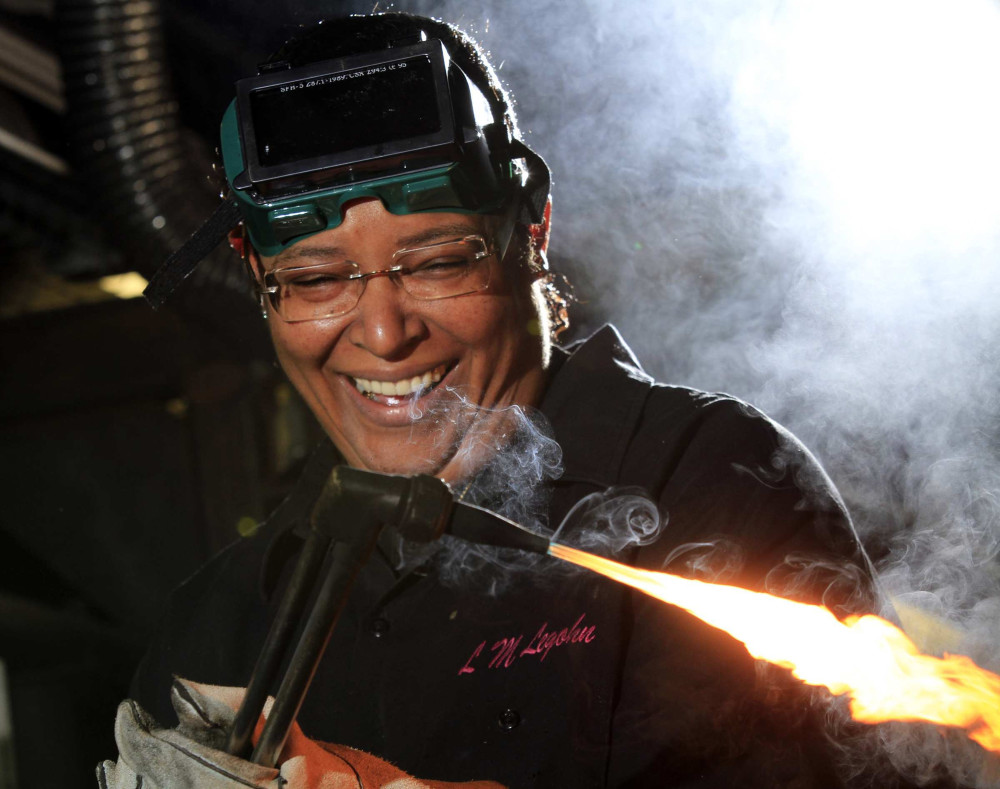By Chris Fleisher
The Pittsburgh Tribune-Review
WWR Article Summary (tl;dr) Despite efforts to expand gender diversity in many industries, certain trades remain overwhelmingly dominated by men. Electricians, plumbers, mechanics — they are all sectors in which women account for a fraction of employees even though women make up nearly half the eligible labor force in the United States. This article takes a look at how one school is empowering women to consider a trade through its mentorship program.
Pittsburgh Tribune-Review
Saturday mornings were when Dana Rudolph indulged her obsession with cars as a little girl.
“I always watched NASCAR on Saturday,” said Rudolph, 42, of the North Side. “I wasn’t a cartoon girl.”
Cars were her passion from the age of 9. But as she got older, she steered toward a career path in administrative support roles, which were more common for women. She didn’t return to her first love until after she was laid off in 2012. She now works as an auto technician at #1 Cochran Hyundai, becoming a rare woman in an industry dominated by men.
Despite efforts to expand gender diversity in many industries, certain trades remain overwhelmingly dominated by men.
Electricians, plumbers, mechanics — they are all sectors in which women account for a fraction of employees even though women make up nearly half the eligible labor force in the United States.
And achieving progress has been difficult. In 2014, women accounted for just 3.9 percent of maintenance and repair jobs, down from 4.3 percent five years earlier, according to census data. The share of construction and of oil and gas extraction jobs held by women in 2014 was 2.7 percent, down from 2.8 percent in 2009.
The issue highlights how cultural attitudes have been slow to change, not only in the industries themselves but in larger society that influences young women’s career decisions.
“I think it starts at the grade school and high school. I think they’re just not as encouraged,” said Anna Bartolini, director of financial aid at Rosedale Technical College, who recently helped create a mentor group at the school for its female students entering the trades. Bartolini said she proposed the mentor group because she didn’t want the women enrolled at the school to “feel like they were out in left field.”
Some trades bring physical demands that women may not find appealing, but they are high-paying jobs. Some industries are working with labor groups, schools and politicians on programs to train and recruit women for these fields. Young Professional Women in Energy, for example, provides mentoring and education to women interested in being part of the region’s shale gas industry.
Dena Pink, 28, said her family supported her interests regardless of traditional gender roles. She inherited her mother’s love of cars — “my car seat was in the back of her ’68 Camaro,” said Pink, who is now enrolled in Rosedale’s automotive technology program.
Pink said she has felt supported at Rosedale but has walked into trade school garages where she felt less welcome.
“Wrenches were put down,” she said. “Their heads would turn, and it was like, ‘A woman!'”
Wendy Gongaware, 18, began in Rosedale’s electrical technology program last year, following the career paths of her uncle and father. She is the only woman in her class, but she said she has a good relationship with her classmates.
“They’ve actually made me feel more comfortable because they seemed to look out for me,” Gongaware said. “They became brothers almost.”
Employers say there is an advantage in promoting more diversity in their ranks.
At #1 Cochran, having women service technicians has been a benefit in dealing with customers, said Sue Gross, the company’s human resources manager. Women are accounting for a larger share of vehicle purchases overall and represent about 40 percent of the market, according to registration data collected by IHS Automotive. When women bring a car in to be serviced, they often feel more comfortable talking to a woman, Gross said.
“There’s a lot of female owners of vehicles and a lot of times, with customer service, they don’t feel inadequate talking to someone of the same gender,” she said.
Many women technicians also have been more patient with younger employees and proved to be better mentors, she said.
During a job fair at Rosedale on Tuesday, Gross was on the lookout for more women to bring into the company. She had scheduled interviews that day with four female students.
Other employers said they have no specific programs aimed at recruiting women but try to eliminate biases that would work against hiring them.
“We’ll take whoever is available and weed out who we think would be the best,” said Ken Callaway, operations manager at Safelite AutoGlass, which is regionally headquartered in Sewickley. “Turning a wrench probably doesn’t appeal to many females, but at the end of the day, the (women) we have are fantastic.”
Callaway said auto glass technicians need to be able to lift a minimum of 75 pounds. Physical standards are common in the trades but can be a sensitive topic for women who have been greeted with skepticism from employers about being up to the demands of the job.
Rudolph said she’s come to expect it. She is 5-foot-5 and “barely” 120 pounds, but she’s capable of lifting a 22-inch tire onto a vehicle.
She said she used to be more sensitive to the condescension from men, some of whom weren’t much larger than herself. But having been in the industry for a couple of years, she said the bias against women is less prevalent than she expected.
“Women, we’re always going to have to struggle to break that glass ceiling,” she said. “In this industry, I expected it to be more intense. It hasn’t been.”














































































































































































































































































































































































